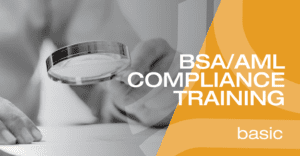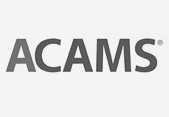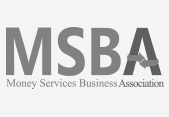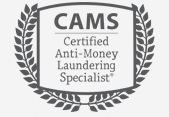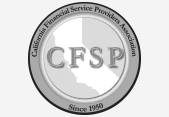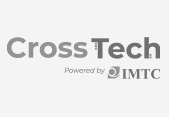An Anti Money Laundering (AML) Program is a set of policies, procedures and internal controls designed to prevent money laundering and terrorist financing. If you are a business that provides money services, you will need an AML Program to satisfy regulators, avoid costly fines and prevent criminal punishment.
MONEY SERVICES BUSINESS
An organization that provides money services is referred to as a Money Services Business (MSB). An MSB is a business that transmits or converts money in one or more of the following capacities:
- Check casher
- Money transmitter
- Provider or seller of Prepaid Access
- Issuer, seller or redeemer of money orders
- Issuer, seller or redeemer of traveler’s checks
- Dealer in Foreign Exchange
As an MSB you must comply with the Bank Secrecy Act (BSA) requirements applicable to financial institutions and the specific requirements relevant to MSBs.
EXAMINATION AGENCIES
Financial Crimes Enforcement Network (FinCEN) acts as the designated administrator of the Bank Secrecy Act. FinCEN has no examination staff, although compliance and enforcement personnel do participate in selected exams. As an MSB, the examination bodies are the Bank and the Internal Revenue Service (IRS). These are the agencies that will audit your AML Program.
AML BACKGROUND
The Bank Secrecy Act was established in 1970 and has become one of the most important tools in the fight against money laundering. Since then, numerous other laws have enhanced and amended the BSA to provide law enforcement and regulatory agencies with the most effective tools to combat money laundering.
The most impactful BSA amendment has been the Uniting and Strengthening America by Providing Appropriate Tools Required to Intercept and Obstruct Terrorism Act of 2001 (USA PATRIOT Act). The Act was passed 45 days after the terrorist attacks on September 11, 2001 and strengthens law enforcement investigatory tools, and other purposes such as:
- Strengthens U.S. measures to prevent, detect and prosecute international money laundering and financing of terrorism.
- Subject to special scrutiny foreign jurisdictions, foreign financial institutions, and classes of international transactions or types of accounts that are susceptible to criminal abuse.
- Requires all appropriate elements of the financial services industry to report potential money laundering.
- Strengthens measures to prevent use of the U.S. financial system for personal gain by corrupt foreign officials and facilitate repatriation of stolen assets to the citizens of countries to whom such assets belong.
Through the years BSA regulations have evolved in order to conform to current criminal activity. It is important to stay on top of BSA amendments in order to update your AML Program policies, procedures and internal controls accordingly.
AML PROGRAM REQUIREMENTS
An AML Program must be in writing and risk-based. The program should commensurate with the risks posed by the location, size, nature and volume of the financial services provided by the MSB.
There are 5 key components that every AML Program must contain:
- Internal policies, procedures and controls
- Designation of a compliance officer
- Ongoing employee training program
- Independent review to test programs
- Beneficial ownership
Internal Policies, Procedures & Controls
Policies, procedures, and internal controls developed and implemented shall include provisions for complying with the requirements including:
- Verifying customer identification
- Filing reports
- Creating and retaining records
- Responding to law enforcement requests
Designation of a Compliance Officer
Designate a person to assure day-to-day compliance with the program. The responsibilities of the Compliance Officer include:
- Monitor the compliance of AML obligations
- Oversee the communication and training for employees
- Ensure that the company keeps and maintains all required AML records
- Be knowledgeable about the BSA and all related regulations
- Understand the company’s services and products as well as the potential money laundering and terrorist financing risks associated with those activities
Ongoing Employee Training Program
All employees that perform money services must understand BSA requirements as they relate to the business. Specifically, they must know the contents of the company’s AML Program.
The Employee Training Program includes (but not limited to):
- Customer identification and verification procedures
- Suspicious Activity Report (SAR) and detection
- Understanding structured transactions
- Currency Transaction Report (CTR) and thresholds
- Additional record keeping requirements regarding money transfer and money order transactions
Independent Review to Test Programs
An Independent Review will ensure that policies, procedures, internal controls, record keeping, reporting functions and training are sufficient. It will also identify any deficiencies and present an opportunity to amend them. This review may be performed by a qualified third party or an employee of the MSB. The person conducting the review must not be the Compliance Officer or report directly to the Compliance Officer.
Beneficial Ownership
Beneficial ownership enhances requirements related to Customer Due Diligence (CDD) expectations. Identifying beneficial ownership is a way for regulators to increase Know Your Customer (KYC) practices through verifying the identity of beneficial owners of legal entity customers.
Elements of CDD expectations:
- Customer identification and verification
- Beneficial ownership identification and verification
- Understanding the nature and purpose of customer relationships to develop a customer risk profile
- Ongoing monitoring to report suspicious transactions and emphasis added for “maintaining”customer information on a risk basis
ONGOING COMPLIANCE
An AML Program is a living document that needs to be updated as your business evolves. The development and ongoing maintenance may seem like a daunting task, but the risk of not being in compliance could cost you your business.
If you would like assistance with creating or updating your AML Program, contact us.
(855) 922-4325
info@CapitalComplianceExperts.com
RECOMMENDED TRAINING COURSE
Tags: AML, Anti Money Laundering, Bank Secrecy Act, BSA, BSA/AML Programs, Capital Compliance Experts, CFPB, Compliance Consulting, Compliance Employee Training, CTR, Currency Transaction Report, Custom Anti-Money Laundering Programs, Financial Services, FinCEN, KYC, Money Service Business, MSB, OFAC, Online Employee Training, Risk Assessment, SAR, Suspicious Activity Report, Third Party Independent Reviews




